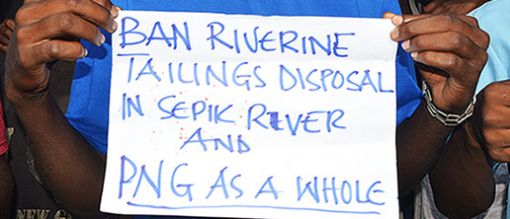Sydney/Wewak- Jubilee Australia and Project Sepik released a new report today about PanAust’s proposed Frieda River Mine project in Papua New Guinea’s Sepik region. The report, The River is Not Ours, is an investigation of the project’s environmental and social impacts and the views of local communities regarding the mine.
The report is a collaboration between two organisations: the Australian-based Jubilee Australia and the Papua New Guinea-based Project Sepik. It is largely based on the findings of an awareness tour of riverside villages conducted by seven team members from Project Sepik.
The report raises questions about the project’s potential impact on the important Sepik River, one of the largest uncontaminated freshwater wetland systems in the region. The mine will rely on the Sepik river for access, transport and tailing dispersal.If approved, the mine could have serious environmental and social impacts for the 400,000 indigenous people who rely on the river for their food, drinking water and transport.
Download the report:
The River Is Not Ours 2019 (1336 KB)
Summary of findings:
1) Despite the potential environmental impacts the proposed mine could have, PanAust has released little to no information about its environmental management plans. This continues to cause uncertainty about whether the company’s environmental management plans will be fit for purpose;
2) It does not appear that PanAust has conducted proper consultations with the indigenous communities living in the Sepik River downstream areas; communities that will be affected if environmental problems ensue. As such, the company is failing to respect the right to Free, Prior and Informed Consent for all impacted communities of the project.
3)The project runs a real risk of leading to damaging social conflict and unrest, mainly due to the lack of meaningful consultations and the troubled history of mining in the region.
PanAust is a Chinese-owned, Brisbane-based mining company with two operating projects in Cambodia. The company was primarily Australian-owned before being bought out in 2015 by the Chinese state-owned enterprise Guandong Rising Assets Management (GRAM).
--
Executive Director of Jubilee Australia, Dr Luke Fletcher, said: ‘The beautiful Sepikriver system is already under considerable strain as a result of the introduction of non-native species, climate change, and the growth of logging projects in the region. Given the history of mining in PNG and theconsiderable practical difficulties that this project is likely to have with tailings management, we feel that the communitieshave legitimate concerns about the potential impacts that the Frieda River mine might have on their environment and their way of life.’
Emmanuel Peni, the Coordinator of Project Sepik, said: ‘The Government of Papua New Guinea, members of our national parliament, and the mining company continue to trivialize our concerns of the destructive environmental and social impacts of this proposed mine. We are best placed to determine our development. From the history of tailings disasters of mines in PNG and throughout the world and therefore, we understand the risks that this project would have to the Sepik.’
Amy Sinclair of the Business and Human Rights Resource Centre said: ‘Papua New Guinea has unfortunately seen business responsible for many human rights breaches and environmental problems in its recent history. This report is a timely warning that seeks to prevent a new environmental disaster and to ensure that Free, Prior and Informed Consent will be upheld in the Sepik.’
--
About Jubilee Australia (www.jubileeaustralia.org)
Jubilee Australia (formal name: The Jubilee Australia Research Centre) engages in research and advocacy to promote economic justice for communities in the Asia-Pacific region and accountability for Australian corporations and government agencies operating there.
About Project Sepik
The not-for-profit organisation Project Sepik Inc was formally established in 2019 but has been working in the region since 2016. Project Sepik advocates for the vision of a local environment with a sustained balance of life via the promotion of environmentally sustainable practices and holding to account those that are exploiting the environment.
Download the report:
- The River Is Not Ours 2019 (1336 KB)
